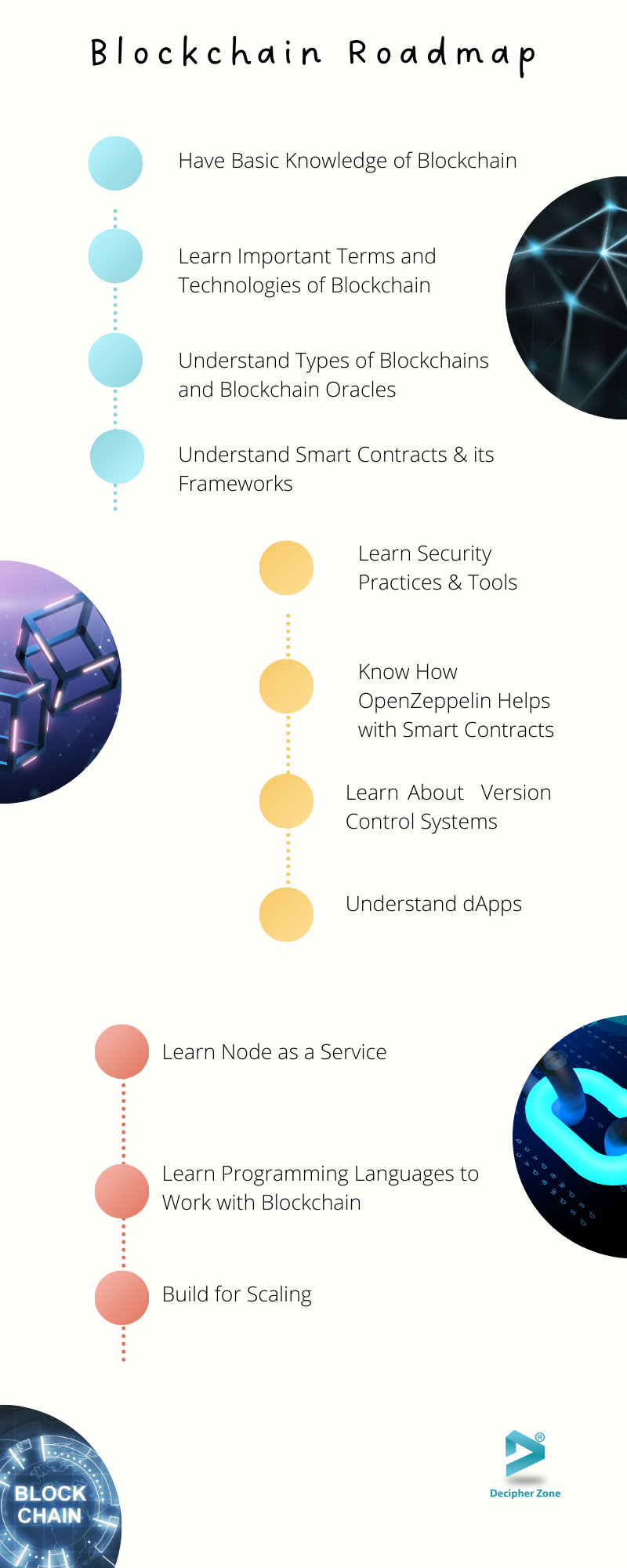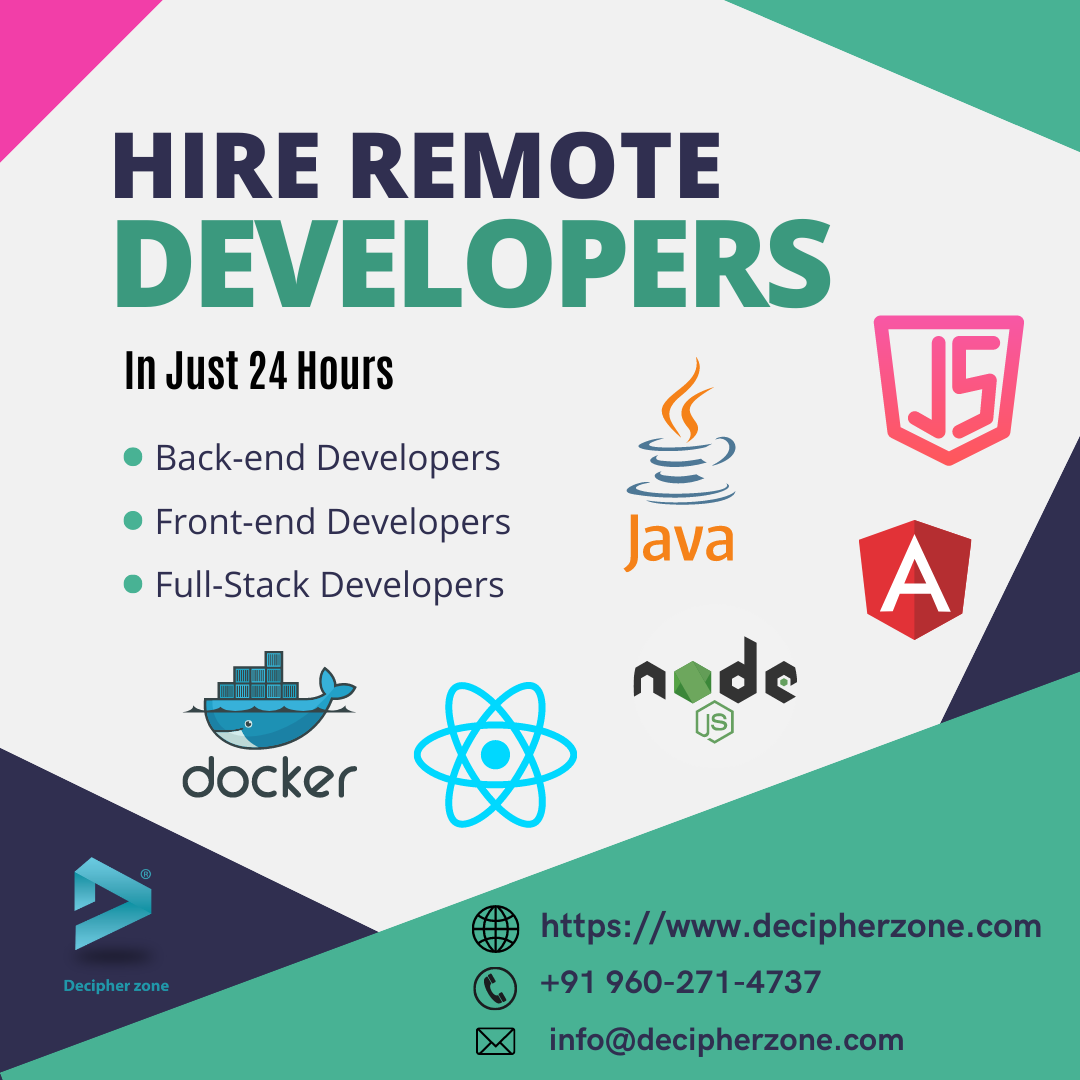The blockchain market is expected to reach 59.5 billion USD at a CAGR of 43.5% by 2024. In the last few months, people have been talking about NFTs, Web3, and Metaverse, giving a boost to blockchain technology.
Given the data it won’t be wrong to say that blockchain technology will have a significant impact on our daily lives, opening a vast range of opportunities for developers who want to have a future in blockchain technology.
Read: Blockchain Testing: Types, Tools & Frameworks
And as you are here, we expect you to have similar intentions. Even if you are someone who knows to code or has no technical background, following this roadmap and learning about the technologies mentioned here will help you achieve your goals.
Read: Backend Developer Roadmap
However, remember that blockchain is still in its infancy, so its technology and tools will evolve shortly. So, we recommend you keep yourself updated with them.
That being said, let’s start with the basics and understand what blockchain is.
An Introduction to Blockchain
Blockchain is an immutable, distributed ledger that promotes transparency, decentralization, data integrity, and security in a network.
Read: What is Blockchain Technology & How Does it Work?
In simple terms, you can think of blockchain as a chain of blocks, where “blocks” represent digital information and the “chain” shows how that digital information is stored in the ledger (database).
Read: Front-end Developer Roadmap
Blockchain enables you to collect, integrate, and share transactional data from multiple sources easily. Here data is broken into shared blocks that are chained together through cryptographic hashtags AKA unique identifiers.
What makes blockchain so popular is its ability to prevent data tampering and fraud because once the data is stored in the ledger it cannot be altered without permission from all the participants involved.
Read: Latest Trends in Blockchain Technology
Some of the benefits of blockchain are
-
Removal of intermediaries
-
Higher-Security Protocols
-
Transaction Verification
-
Lower costs
-
Immutable
-
Decentralized
-
Provide transparency in the network
Responsibilities of a Blockchain Developer
Now that you know what blockchain is, knowing what responsibilities a blockchain developer's role entails is also important. To help you out, here is the list of blockchain developer responsibilities:
-
Review security and functionality of smart contracts
-
Implementing code resilience across different platforms
-
Managing blockchain technology-based web services
-
Supervising complete blockchain web app development lifecycle
-
Planned, designed, developed, and tested blockchain-based web app systems.
-
Integrating blockchain technology within existing web applications.
-
Creating smart contracts while keeping expectations and given timelines in mind
-
Summarize client’s requirements into clear and concise code.
Roadmap to Become a Blockchain Developer in 2024
2024 Roadmap for Blockchain developers. With a clear understanding of the responsibilities that a client and company might have from the blockchain developers. Let’s move ahead and take a look at the tools and technologies that you need to be aware of to become a successful blockchain developer.
Read: How Much Does it Cost to Develop a Crypto Wallet App
Have Basic Knowledge of Blockchain
The first step you need to take to be a blockchain developer is to learn the basics of blockchain technology, including but not limited to decentralization, blockchain & its structure, basic blockchain operations, why blockchain matters, and the uses and applications of blockchain.
To become a successful blockchain developer, you’ll need to participate in bootcamps, as most colleges don’t offer courses on the blockchain or blockchain-specific training.
Learn Important Terms and Technologies of Blockchain
Once you are familiar with the basics of blockchain, it is time to start understanding other crucial aspects like cryptography, storage, consensus protocols, decentralization vs trust, blockchain forking, blockchain interoperability, crypto wallets, mining and incentive models, and cryptocurrencies.
Understand Different Types of Blockchains
The blockchain system differs in design especially when it comes to consensus mechanisms. Blockchain is divided into three types: PoW, PoS, and Private.
Other than that, some of the popular blockchain platforms that are used by blockchain developers to create blockchain systems are Solana, The Open Network (TON), Ethereum Virtual Machine (Ethereum, Polygon, Gnosis Chain, Huabi Eco Chain, Avalanche, Fantom, Binance Smart Chain, Moonbeam), and L2 Blockchains (Moonriver, Aribtrum).

Learn About Blockchain Oracles
The next thing you need to know to become a blockchain developer is “blockchain oracles”. A blockchain oracle is used to connect smart contracts to external systems for smoother execution based on inputs and outputs from the real world. Blockchain oracles are of many different types including Chainlink, Hybrid Smart Contracts, Oracle Networks, etc.
Read: DevOps Engineer Roadmap
Some of the main use cases of blockchain oracles are Decentralized Finance (DeFi), Insurance smart contracts, Dynamic NFTs, and Gaming.
Understand the Concept of Smart Contracts
You might have already heard about smart contracts a few times. But do you know what it is and what’s the importance it holds in blockchain technology?
Smart contracts are program protocols that are stored on the blockchain and only run on predetermined conditions. With smart contracts, developers can automate the workflow by triggering the next action after meeting the conditions.
Read: How to Build a Blockchain In Rust
Some of the technologies and concepts that are used with smart contracts are ERC tokens, IDEs, Crypto Wallet, Crypto Faucets, Decentralized Storage, programming languages (Rust, Vyper, and Solidity), Testing (unit, integration, and code coverage), Deployment, Upgrades, Monitoring, etc.
Know About Smart Contract Frameworks
Creating a smart contracts is made easier with frameworks like HardHat, Truffle, Foundry, and Brownie. These frameworks consist of several needed components, functionalities, features, and plugins to make dApp and smart contract development fast, reliable, secure, and easier.
Learn Security Practices & Tools
Smart contracts play a crucial role in developing blockchain-based apps. Smart contracts are not only flexible but also capable of controlling a vast amount of data while executing immutable logic to create a vibrant environment for decentralized apps.
Read: How Will Blockchain and IoT Impact Supply Chain & Logistics
The engineering mindset required to program smart contracts is different. While changing code can be difficult, the cost of failure is too high. So to keep smart contracts secure, you need to know security practices like common threat vectors, fuzz testing, static analysis, and source of randomness attacks.
A few tools that can help you in securing smart contracts are Echidna, Manticore, Slither, and MythX.
Know How OpenZeppelin Helps with Smart Contracts
Managing smart contracts can be difficult, however, using a management platform like OpenZeppelin can be extremely helpful. Using the OpenZeppeling tool for management can help in removing risks associated with manual tracking.
Understand Version Control System
Like any other developer, if you want to keep track of and control all the changes that have taken place in your source code, understanding version control systems is a must. With version control systems comes the control to make atomic code revisions, compare code versions, and branch certain points. Some of these version control systems that one can learn are BitBucket, GitHub, GitLab, etc.
Learn All About dApps
dApps or Decentralized applications can operate autonomously using smart contracts. dApps are like digital apps that employ blockchain technology to keep users’ information secured and separated. To work on dApps you need to know its Client Libraries (Moralis, ethers.js, web3.js), Client Nodes (Substrate, Geth, Besu, Nethermind), and Applicability (NFTs, Payments, Insurance, DeFi, or DAOs) along with tools for testing, deployment, architecture, security, and maintenance.
Learn Node as a Service
When you are just getting started with blockchain or need to scale it faster, creating and running a node can be quite challenging. To optimize node infrastructure, you can use services like Quicknode, Alchemy, Infura, and Moralis while keeping yourself focused on application development.
Know Blockchain Supporting Languages
Finally, know the programming languages that support working with blockchain and smart contracts. A few such languages that you must be familiar with are JavaScript, Go, and Python.
Know How to Scale
To help you scale the limited number of transactions per second of blockchain, a variety of technologies and mechanisms have been introduced. A few of them that you can learn about are State and Payment Channels, Zk Rollups & Zero Knowledge Proof, Validium, Plasma, Sidechains, Ethereum 2.0, Optimistic RollUps and Fraud Proofs, and On-Chain Scaling.
Conclusion
So that was all about how one can become a blockchain developer. We hope that this blog has helped you in setting the right path for your future. But as mentioned earlier, blockchain is still in its initial phase and is getting several new tools, services, mechanisms, and practices to make it more powerful.
So, don’t just rely on tools and services that are mentioned here, instead keep learning whatever new comes into the market for blockchain. Partnering with a Web3 marketing agency can provide additional insights into market demands and trends, ensuring that your skills remain relevant and in high demand in this rapidly evolving landscape.

However, if you are an entrepreneur looking for an experienced blockchain developer to create a App or Smart Contract for your business, then get in touch with us and hire blockchain developers under your budget now!

